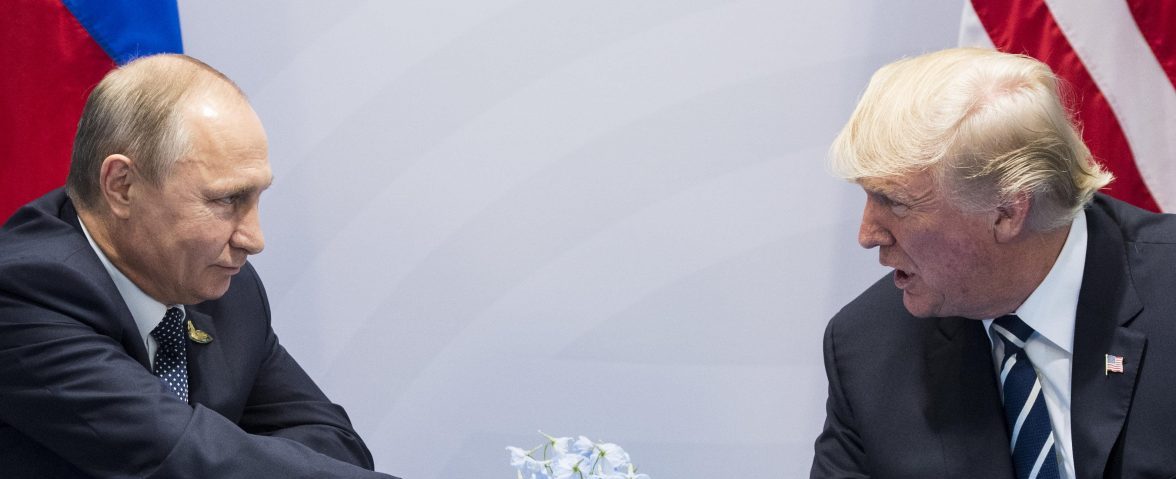In the run-up to the Helsinki summit between President Putin and President Trump we discussed expectation and possible outcomes of the encounter with the leading American experts on Russia – Andy Cuchins, Alexander Cooley and Jeffrey Mankoff.
We know that many, including in the Trump administration and government agencies have either discouraged the President or been critical of his desire to meet with Putin. Why does Trump still want the summit and what, in your view, would be an incentive for Putin for this meeting?
Andy Kuchins, Senior Fellow, Center for Eurasian, Russian and East European Studies at Georgetown University.
Trump’s desire to meet with Putin and attempt to put the US-Russia relationship on a more positive track has been one of the few consistent positions he has held since the beginning of his campaign in 2015 through the present. So we should not be surprised by this. Similarly, Trump’s frustration with the Russia investigations and Congressional “hostile” takeover of Russia policy with the CAATSA legislation last summer only further drives him to be the contrarian to go where few thing he should. Finally, he also holds an image of himself as the world’s greatest negotiator and so relishes opportunities to do what others have failed to do, such as his supposed breakthrough with North Korea’s Kim Jun Un.
Alexander Cooley, Claire Tow Professor of Political Science and Director of The Harriman Institute for the Study of Russia, Eurasia and Eastern Europe, Columbia University
The one emerging consistency about Trump’s foreign policy is that it is personalistic in the extreme. Trump routinely ignores the advice of the various bureaucracies, expert advisors and formal policy channels in favor of disruptive proclamations that are aimed to make himself the center of attention and focus of decision-making. Trump clearly also prefers high-profile summits involving world leaders, as opposed to multilateral fora such as the G7, where he can emphasize optics and media coverage, over consensus declarations. Trump’s Russia policy is a good example of both of these dynamics- Trump clearly feels he has a personal chemistry with Putin and wishes to be perceived as a grand dealmaker.
Jeff Mankoff, Senior Fellow and Deputy Director, Russia & Eurasia Program Center for Strategic and International Studies (CSIS)
Trump’s own interest in the summit seems driven by his desire for a spectacle and the elusive possibility of a big win. As in the summit with Kim Jong Un, it seems Trump views the meeting with Putin as an opportunity to cut through a Gordian knot of problems that have stymied his predecessors, demonstrating that he is the only one capable of repairing a U.S.-Russia relationship that has gone dangerously off-course. As for Putin, the summit, is an opportunity to sit at the proverbial high table, discussing global problems with the U.S. president as an equal. The summit also presents Putin an opportunity to demonstrate that, despite everything, he is not isolated (and that by extension, neither is Russia)—that even the U.S. has no choice but to engage with Russia.
This summit is likely to be filled with lots of symbolism but many in both Moscow and Washington question whether it’s going to be any substantive. What, in your view, could this summit best accomplish? And what would be its worst possible outcome?
Andy Kuchins
Both sides seem to play down the likelihood of major breakthroughs in this meeting and frame the fact that the two leaders are meeting and elevating their dialogue as an achievement in and of itself. The situation in Syria is quite interesting now with perhaps cracks between Russian and Iranian interests more visible over the longer-term role of Iranian ground forces and militias on Syrian territory to facilitate a corridor to exert more influence in Lebanon. Israel has made it very clear to Moscow and others that view Iran’s presence in Syria as very threatening and will only tolerate so much. To what extent, if any, Moscow is prepared to constrain their Iranian partners is an important question for this meeting, Syrian reconciliation, and Middle East peace more broadly.
Alexander Cooley
I think the premise of the question is correct – both leaders will welcome the symbolism and international media coverage of a re-engagement. But, as we have seen over the last year, Trump has a few core beliefs, but willfully extricates himself from policy nuances and even advice on key policy matters. Thus, the danger of the summit– as we saw in Singapore– is that Trump agrees to the contours of grand bargains on issues like Syria, Ukraine or NATO expansion, but is then soundly criticized and even rolled back by the bureaucracy and Congress. In turn, this is likely to, yet again, lead to yet another cycle of inflated expectations and subsequent letdowns.
Jeff Mankoff
At a minimum, the summit represents a chance to jump-start dialogue between Moscow and Washington on issues of critical importance, especially the future of the arms control framework and European security. The best possible outcome is probably that the U.S. two sides re-establish channels of communication that have become moribund in recent years and at commit to maintaining the INF and New START agreements as the basis for strategic stability while the U.S. conditions further progress on adherence to the Minsk agreement and an end to Russian political interference. More concrete agreements seem unlikely given the lack of preparation and, frankly, the dramatis personae. The worst possible outcome would be a disastrous NATO summit this week, followed by a Trump-Putin meeting that produces a communique that doesn’t mention either Minsk or interference, and where Trump makes some kind of commitment to reduce U.S. pressure with no quid pro quo.
Russian Foreign Ministry cautioned against using “big words such as breakthroughs” when talking about the summit, yet experts and diplomats have been having meetings to build the agenda for the encounter. Are you anticipating any agreements, in particular on Syria and Ukraine, arms control?
Andy Kuchins
I do not expect any major breakthroughs in Helsinki, but perhaps the two sides could agree to establish bilateral working groups on Syria, nuclear security, and cybersecurity (I realize the latter was discussed in the first Putin-Trump meeting resulting in considerable controversy and embarrassment for Trump. Nevertheless, the need for such dialogue remains imperative.). Whether or not the two sides really want to further reduce their nuclear arsenals (currently it appears neither do), they do need to address the now imminent expiration of the New Start Treaty in 2021, the dispute over the 1987 INF Treaty, and how to manage nuclear security going forward whether New Start and INF endure or not. Without such a dialogue, we would venture into a more dangerous nuclear stand-off than any time since the early 1970s.
Alexander Cooley
I am pessimistic on this front- Trump has repeatedly stated that he views nuclear modernization and build-up as a key pillar of military strength. As for Syria, Trump is searching to extricate US forces from Syria, so will be open to Russian plans and proposals. Whether the Pentagon will follow on an expedited timeframe is another matter. Ukraine is trickier, as any concessions– particularly on Crimea– will be cannon-fodder for Trump’s domestic political opponents and a vote to consider lifting sanctions, even for the President’s strongest congressional backers, will place them in a difficult political position. Trump’s inner circle will also be mindful of the Special Counsel’s ongoing investigations into the Trump campaign’s possible ties to actors with interests in Ukrainian affairs.
Jeff Mankoff
There are agreements, and then there are agreements…. Having an agreement on paper is comparatively easy, as Trump’s meeting with Kim showed. The challenge is translating those paper agreements into substantive steps that address the core of the problem. Here, I suppose Syria is (comparatively) easier to deal with since overall U.S. and Russian goals are not diametrically opposed: the civil war is winding down, Trump wants to reduce the U.S. presence in Syria (which Putin also supports), both sides would like to see the Iranian presence limited. So some kind of deal on Syria seems at least feasible, even if it ends up not being very ambitious in scope. Ukraine is much tougher, especially given Ukraine’s own electoral timetable and political uncertainty, not to mention that fact that U.S. and Russian objectives are still quite far apart. Again, a deal on paper could happen, but substantive steps seem unlikely.
The future of the arms control framework is very much up in the air, in part because of the development of new weapons systems that can have strategic effects comparable to nuclear weapons but are not covered by any of the existing agreements, and in part because everyone involved seems to have lost the urgency that once existed around these issues. One or the other problem on its own might be soluble, but both at the same time make for a very difficult situation. New technologies (and nuclear proliferation) require new agreements and new conceptual frameworks that link together strategic and non-strategic nuclear weapons, strategic conventional weapons, and (probably) cyber capabilities. I have little confidence in the capacity of this U.S. administration to do that kind of conceptual thinking, even if the political will existed. So if the existing framework falls apart, uncertainty and instability seems the most likely outcome.
Following the summit we are likely to have multiple reports relishing details of the meeting: the body language, whether Trump raised the issue of the “Russian interference”, also the joint press conference is probably going to be a big show that journalists and pundits will be long chattering about. But what comes next when the information dust settles? Can this meeting then lead to something bigger or it’s rather unlikely?
Andy Kuchins
If the two presidents come away from this meeting having tasked their bureaucracies to establish or broaden dialogues on Syria, nuclear weapons, cyber, and/or Ukraine, this would mark a modest step forward. Putin has more degrees of freedom than Trump, but he has not evinced much of an inclination to use them. For Trump, if the Russia investigations are concluded and he is exonerated and the Republicans hold on to the House in the mid-term elections in November, he will be less constained.
Alexander Cooley
Trump is likely to face intense domestic blowback for the meeting, especially if he continues his antagonistic stance towards NATO allies. The additional problem for US-Russia relations is that Trump’s controversial domestic agenda risks conflating conciliatory relations with Russia with Trump’s agenda. As such, by personalizing the US-Russia relationship, he risks a substantial political backlash where President Putin is conflated with President Trump. If the Special Counsel’s investigation into Russian election interference and collusion with the Trump campaign issues more indictments over the next couple of months, the domestic political context will become even more difficult. My own view is that for us to make sustainable progress, US policy towards Russia has to be based on bipartisan principles and foreign policy consensus. The current tumultuous domestic political situation in the United States currently precludes such consensus.
Jeff Mankoff
If the summit ends up creating momentum for more sustained engagement without Trump giving up important U.S. commitments, then it could end up being a qualified success. At this point, regular, and more sustained dialogue between Moscow and Washington (coupled with a recognition that none of the problems in the relationship can be resolved absent negotiation) is probably what improved relations look like.












